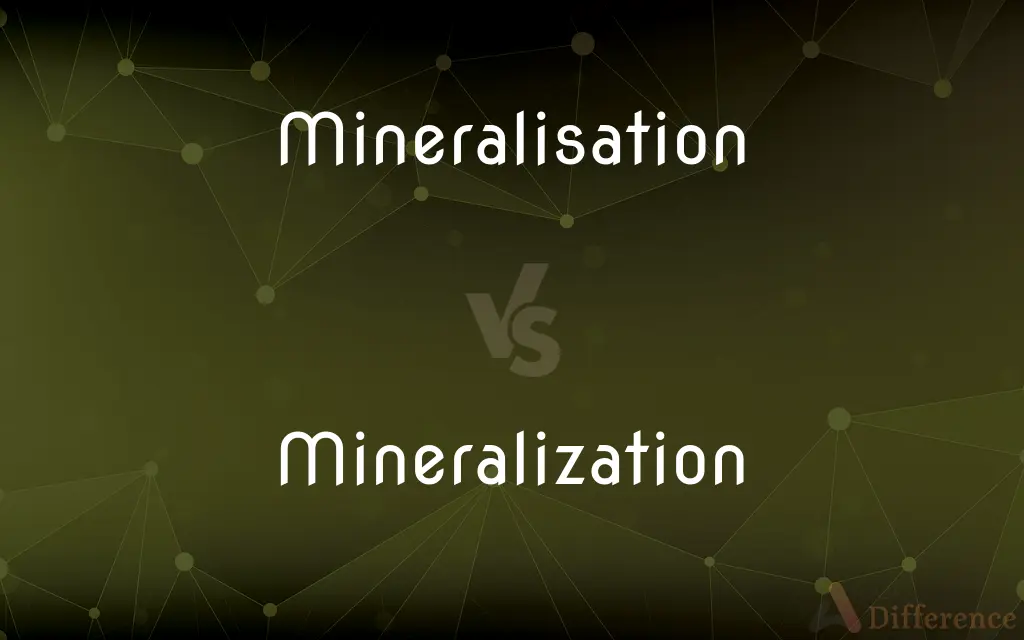Mineralisation vs. Mineralization — What's the Difference?
By Tayyaba Rehman & Maham Liaqat — Updated on May 2, 2024
Mineralisation and mineralization refer to the same process, differing only in British and American spelling respectively.

Difference Between Mineralisation and Mineralization
Table of Contents
ADVERTISEMENT
Key Differences
Mineralisation, often used in British English, refers to the process where organic materials are converted into inorganic substances through natural processes. On the other hand, mineralization, the American English spelling, describes the same biochemical conversion, emphasizing geological and biological contexts.
.In the context of ecology, mineralisation is crucial for nutrient cycling, helping decompose organic matter into simpler inorganic compounds. Whereas mineralization plays a similar role in ecosystems across the United States, facilitating the breakdown of materials like plant residues and animal remains into elemental forms such as nitrogen or phosphorus.
In soil science, mineralisation influences soil structure and fertility by contributing to the mineral content. Mineralization, similarly, affects the soil in American regions, enhancing its ability to support various plant life and agricultural practices.
Geologically, mineralisation involves the deposition of economically important minerals through processes like hydrothermal activity. Mineralization, on the other side, refers to similar geological processes that form mineral deposits, critical in mining industries in the U.S.
In research and academic writing, the use of "mineralisation" or "mineralization" often indicates the author's geographical or institutional alignment. British researchers tend to use "mineralisation," while their American counterparts prefer "mineralization."
ADVERTISEMENT
Comparison Chart
Spelling
Mineralisation
Mineralization
Usage
Preferred in British English
Preferred in American English
Contextual Use
Ecological, geological
Ecological, geological
Importance in Soil Science
Enhances soil fertility
Enhances soil fertility
Academic Preference
Used in UK institutions
Used in US institutions
Compare with Definitions
Mineralisation
In waste treatment, the breakdown of organic waste.
Efficient mineralisation can reduce landfill mass significantly.
Mineralization
The process aiding nutrient cycling in ecosystems.
Mineralization in forests contributes to the nitrogen cycle.
Mineralisation
The biochemical conversion of nutrients.
Soil mineralisation helps release nitrogen into plant-usable forms.
Mineralization
The enhancement of water quality through mineral addition.
Water mineralization is critical in maintaining drinking water standards.
Mineralisation
In water treatment, the addition of essential minerals.
Water mineralisation involves adding magnesium for health benefits.
Mineralization
The conversion of organic substances into inorganic by natural processes.
Leaf litter undergoes mineralization rapidly in moist conditions.
Mineralisation
The process of turning organic material into minerals.
The mineralisation of bone tissue is essential for skeletal strength.
Mineralization
To convert to a mineral substance; petrify.
Mineralisation
The geological formation of mineral deposits.
Mineralisation in the area indicates potential copper deposits.
Mineralization
To transform a metal into a mineral by oxidation.
Mineralisation
Alternative spelling of mineralization
Mineralization
To impregnate with minerals.
Mineralization
To develop or hasten mineral formation.
Mineralization
To collect or study minerals.
Mineralization
A form of fossilization in which the organic parts of an organism are replaced by minerals.
Mineralization
The breakdown of organic matter in the soil to form soluble inorganic compounds.
Mineralization
(medicine) The deposition of calcium salts in abnormal parts of the skeleton.
Mineralization
The addition of minerals to water to make a mineral water.
Mineralization
The process of mineralizing, or forming a mineral by combination of a metal with another element; also, the process of converting into a mineral, as a bone or a plant.
Mineralization
The act of impregnating with a mineral, as water.
Mineralization
The conversion of a cell wall into a material of a stony nature.
Mineralization
The formation of mineral ores in geological contexts.
Mineralization processes are targeted in mining explorations.
Mineralization
The natural breakdown process in organic waste management.
Mineralization helps in reducing organic waste in compost.
Common Curiosities
How does mineralisation affect soil health?
Mineralisation improves soil health by contributing to its mineral content and enhancing fertility.
How does mineralization influence ecological cycles?
Mineralization is key in nutrient cycling, especially in converting organic matter into nutrients that plants can absorb.
Where is mineralization commonly used?
Mineralization is primarily used in American English contexts.
What is mineralisation/mineralization?
Both terms describe the process where organic materials are transformed into inorganic substances, with "mineralisation" being the British spelling and "mineralization" the American.
Can mineralisation/mineralization occur in water treatment?
Yes, it involves adding essential minerals to water, enhancing its quality and health benefits.
How does mineralization affect mining industries?
Mineralization processes are critical for identifying and extracting valuable mineral deposits.
Where is mineralisation commonly used?
Mineralisation is commonly used in British English speaking regions.
Is there a difference in the scientific meaning of mineralisation and mineralization?
No, scientifically both terms mean the same; the difference lies only in regional spelling preferences.
Is mineralisation related to the fossilization process?
While mineralisation involves the conversion of materials to inorganic substances, fossilization specifically refers to the preservation.
What role does mineralisation play in waste management?
It aids in the breakdown of organic materials, reducing waste volume and aiding in composting processes.
Share Your Discovery

Previous Comparison
Reverend vs. Deacon
Next Comparison
Nooo vs. NoAuthor Spotlight
Written by
Tayyaba RehmanTayyaba Rehman is a distinguished writer, currently serving as a primary contributor to askdifference.com. As a researcher in semantics and etymology, Tayyaba's passion for the complexity of languages and their distinctions has found a perfect home on the platform. Tayyaba delves into the intricacies of language, distinguishing between commonly confused words and phrases, thereby providing clarity for readers worldwide.
Co-written by
Maham Liaqat















































